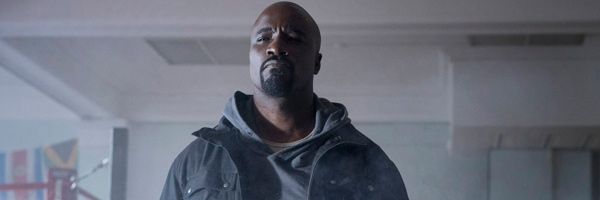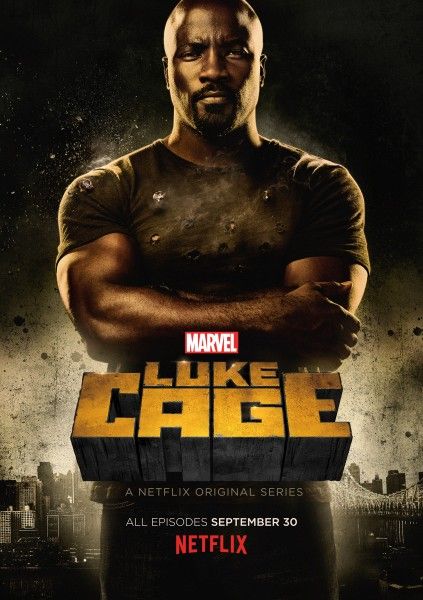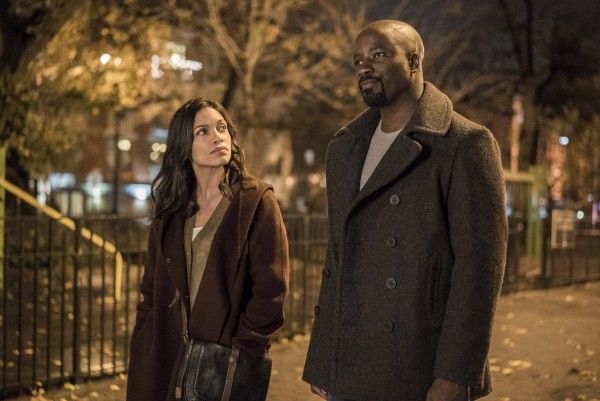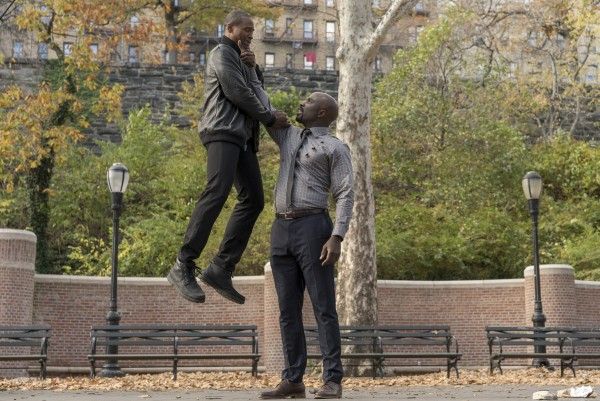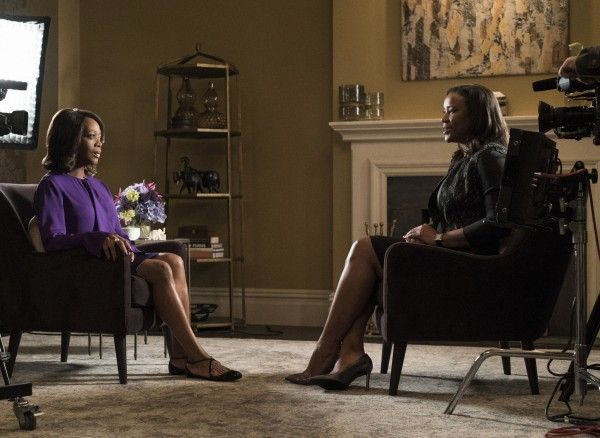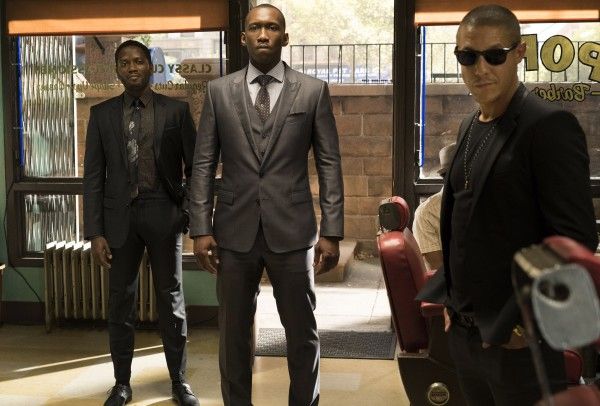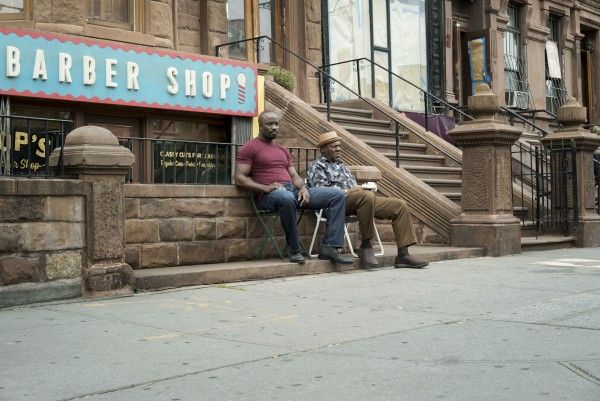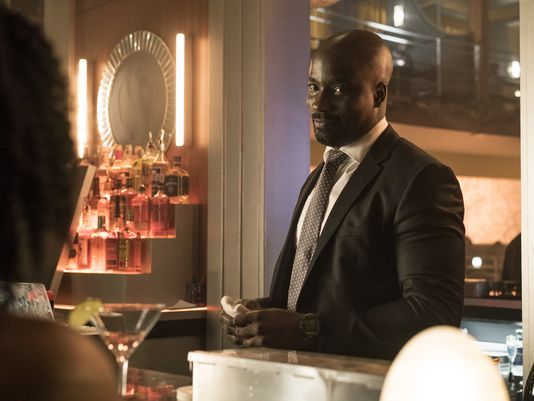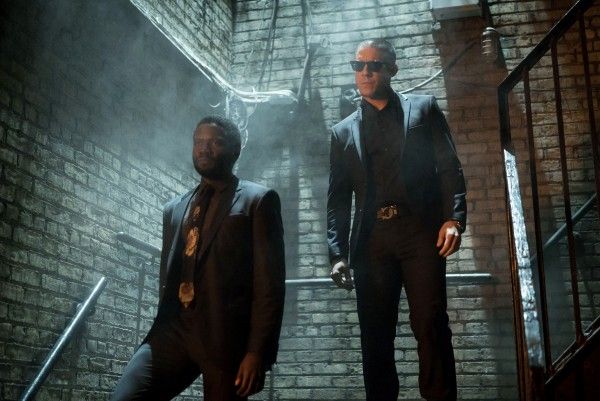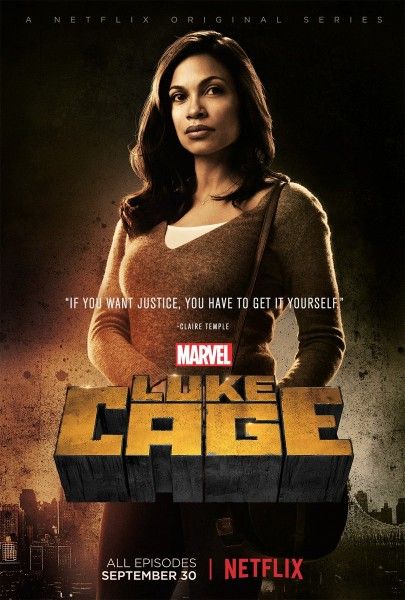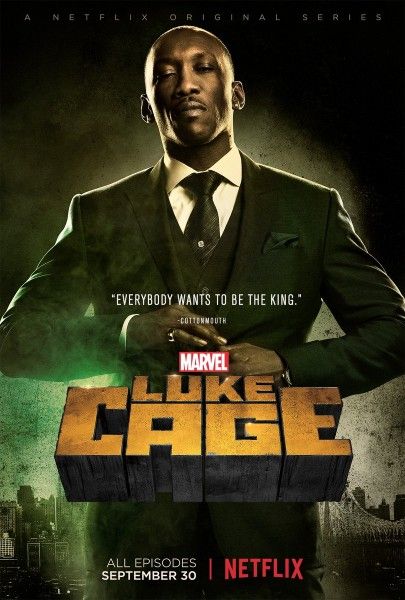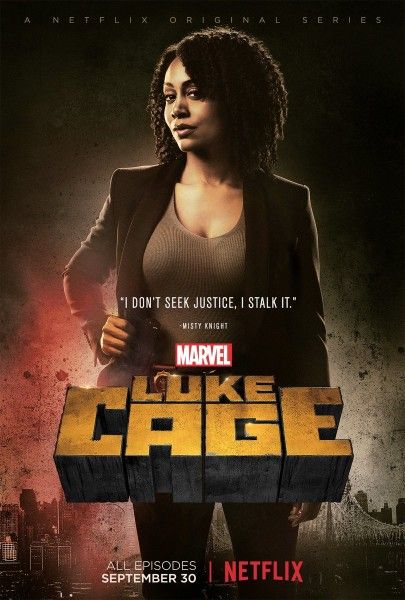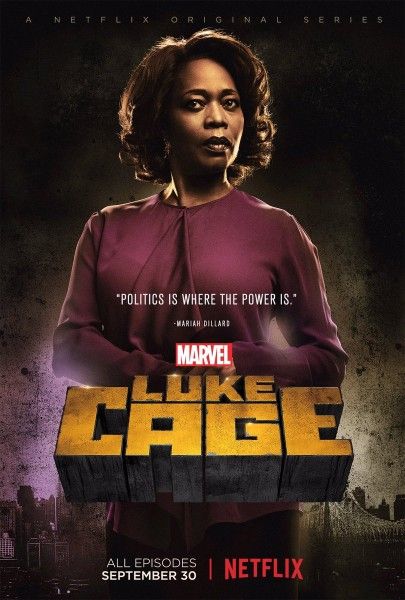On the Netflix series Marvel’s Luke Cage, a sabotaged experiment has left Luke Cage (Mike Colter) with super strength and unbreakable skin. Now a fugitive trying to rebuild his life in modern day Harlem, New York, he is pulled out of the shadows and must face his own past, in order to save the future of his city. The series also stars Alfre Woodard, Mahershala Ali, Simone Missick, Frank Whaley, Theo Rossi and Rosario Dawson.
During roundtables to discuss the latest Netflix installment of the Marvel street-level heroes lead actor Mike Colter, showrunner Cheo Hodari Coker and Head of Marvel TV Jeph Loeb talked about how Luke Cage is tonally and visually different from the other Netflix series, how the season is structured, finding the character, how Luke Cage is like the Notorious B.I.G., addressing real issues in a superhero story, constantly upping the stakes, where the villains fit into it all, and Easter eggs.
Be aware that there are some minor spoilers discussed.
Question: How is Luke Cage tonally and visually different from the previous Netflix series from Marvel?
JEPH LOEB: All of our shows have very distinct looks to them, and the reason for that is that we’re trying to stay true to the original characters, stories and intellectual properties. In the same way that, if you were to go and buy a Daredevil comic or an Alias, or Jessica Jones, comic, or Agents of S.H.I.E.L.D., they all have a very distinct look to them. Luke Cage always has had a very distinct look to it. Specifically in terms of some of the things we talked about, we moved the story up into Harlem. There really are five Defenders in the Netflix/Marvel stories. There’s Daredevil, Jessica Jones, Luke Cage and Iron Fist, and the fifth Defender really is New York City. The city is a character that we use, all over. We shoot in New York, and we’re very lucky to have the cooperation of both the mayor and the governor, and everybody that’s working with us there. We shoot long hours, in very challenging places, like on rooftops, down in the sewers, out on the wharf, and in the middle of Central Park. And we shoot a lot at night, in the winter. We’re trying to tell a story that takes place over a short amount of time, so as it starts to get colder, our esteemed actors are still wearing the clothes that they were wearing before, when it was probably the fall.
How have you structured this season?
CHEO HODARI COKER: How we structured the storytelling for these 13 episodes is that every single episode represents an act. Episode 1 is Act 1, Episode 2 is Act 2, Episode 3 is Act 3, and then the fourth episode always has a twist. The fourth episode feels like a culmination. And then, Episodes 5, 6 and 7 go another direction, and Episode 8 has another twist. And then, there’s Episodes 9, 10 and 11, and another twist with Episode 12. And then, the finale is just wow.
Mike, was there a moment, as an actor, when you felt like you were Luke Cage and that you really had the character?
MIKE COLTER: That’s a good question. I would like to think I found him somewhere in Jessica Jones. As an actor, you learn, every time you work. When I was working and training, as an actor in school, I remember working on Frankenstein. I still talk to the director from that today. We still have conversations. That guy was very instrumental in me becoming an actor, in my journey as a student, and me going on and finding my graduate school, so I keep in contact with him, quite a bit. So, we did a production of Frankenstein and I played the creature, and that was in South Carolina. There are racial connotations to that, but it never crossed my mind, at all. I was the only black character in the production, and I was playing the monster. The monster wasn’t disfigured. There was just this incision in his face, and that was my idea. I said, “If you were creating a creature, why would you go around getting pieces from everything and sew them together? Wouldn’t you get one good body and put a brain in it?” That seemed reasonable to me. So, the creature was this guy who was supposed to be the perfect human, in some sense, and not so much physically. And he doesn’t speak for awhile, so you learn so much about your character by doing and not speaking. Dialogue is not always the best way to show emotion, to show your thought process, or to reveal yourself, as a character.
I learned so much from that. I found this character in Jessica Jones by watching how he dealt with Jessica. It was a very unique thing to have this guy with all this power and presence, listening to a headstrong woman who had these issues, and never trying to impose his will on her or her life and never trying to intervene, but instead allowing her to have her space and to be there in a supportive fashion, and to have his own problems and not try to take the stage. A lot of times in life, women want to talk, but men don’t want to listen, and if they do want to listen, they turn it back to themselves. Luke had his problems, but he never bothered to bring them into it. It was a very, very interesting way that he dealt with her, and that let me in on the kind of person he is. That takes a very strong person, mature person, and wise individual, and that’s where Luke was different. Luke is a very good person to have this kind of power because he’s not abusing it.
Because Luke Cage didn’t ask to be turned into what he is now, can he get to a place where he can reconcile those two halves of himself, or is that the ongoing journey?
COKER: What’s great about working with Jeph Loeb on this show is that you’re speaking to somebody who is one of the more legendary comic book writers of his era. I think his work, particularly on Batman, Spider-Man and Daredevil, makes him one of the best comic book writers. He was on the staff of Heroes, as well as Lost. And then, at the same time, he also wrote films. What was great for me, as a collaborator, was that I could get very deep into scene construction and motivations with him. One thing that he always said was that Marvel heroes, in particular, when you look at the best ones, never want their powers and are never happy about their powers. Wolverine certainly is not happy about the claws or his healing ability, even though it greatly extended his life. Spider-Man would give everything back to be with his Uncle Ben.
That’s the thing with Luke. He didn’t ask for this powers or responsibilities. The people that he cares about end up dead. And so, part of what the arc of the first season really is about is, how does one reconcile being a hero, and how does one accept it and try to find their identity in it, particularly because he doesn’t have a mask and isn’t hiding. If we get a Season 2, it’s going to explore more of how a hero evolves, when most heroes have a mask or are able to hide certain aspects of themselves, but Luke is out there.
It’s something I saw happen in my background as a hip-hop journalist. Christopher Wallace was totally different from Notorious B.I.G. Part of what he went through, in his short life, was trying to reconcile being Notorious B.I.G. and Christopher Wallace. Right before he passed away, unfortunately, he finally figure out that they were two separate things, and that he could be both. Right when he really figured it out and grounded himself, he was murdered. But when I think about identity and I think about Luke, that’s definitely an influence. Identity and the acceptance of responsibility is what drives him, as a person. What it allows the character to explore is evolution of a man, which is the best thing you can ask for on a series where you’re going to do this, over and over, in different ways.
Luke Cage is fun, but it also addresses some real issues. Was that something you intentionally wanted to bring to this show?
COKER: It’s funny, that’s the original comic. The origin story was about how Luke ends up in prison for a crime he didn’t commit, and then he volunteers for an experiment. We just switched the volunteer element of it to make it that he had to do it, but he still has the powers and breaks out. This is really the first series where we get to explore the origin of how he gets his powers, but at the same time, look at how it affects his life, now that he’s in a different environment. Really, it’s a Western. It’s as much Shane, as it is Shaft. There are those kinds of showdowns with the mysterious man without a name, cleaning up the town and being very reluctant to do that.
COLTER: It never gets old. This hero steps into this other gear and becomes what we know he is, even though he’s reluctant to show us that side of himself. That’s what’s always appealing, when you know a person is a bad-ass and you know he can fuck them all up, but he’s just holding back, and they keep on poking the bear until they get what they want. He doesn’t feel proud that he’s done this, but what are you going to do?
You also address and handle race in a very compelling way. Why was that important to the telling of this story?
LOEB: It’s impossible to do justice to the first African American street-level hero, that’s been translated into another medium, and not take that into consideration. It’s not fair to the character or to the original IP, and it’s certainly not fair to the origins of Luke Cage, in terms of what was going on in the early ‘70s, when that book came out, and how that book affected a young Cheo Coker, who was looking for something to connect with and found it. In Luke Cage, Cheo found a character that looked like him and that looked like his world, that he could connect with. That is very important to us. But make no mistake about it, the story that we’re telling is the story of a man that has to accept what happened to him in the past, in order for him to move forward. Always moving forward is something that we talk a lot about in the show, and not just with his character, but with all the other characters. That’s something that each of us can embrace, understand and follow. It doesn’t matter what color you are. Now, if you also get something else out of it, that happens to deal with what’s going on in this country right now, or in this world right now, than great.
With Jessica Jones, no one set out to tell a story that had a feminist doctrine about it, and Melissa Rosenberg would be the first person to say that. We told a story about a woman who was trying to get her act back together again. She was trying to do something, fell apart, and had to bring it back together. Everything else that came with it, came with it, and that resonated and hit a tone that we were very excited about. That’s what Marvel is. Marvel always works best when we are a metaphor for what is going on in the real world. We don’t work really well with a guy who comes from another planet, puts on a cape, and goes out and fights crime. It’s just not what we do. It lives much better in a world where you go, “Oh, this feels like something that we’re talking about.”
With Civil War, there’s the idea of registration and people being different, and all of that came out of the Patriot Act and what was happening in the post-9/11 world. Each item does come from a place of grounded reality, and that’s the thing that’s much more important. If, at the end of our story, you come away from it feeling like this is a story about people and not about anything other than that, and that we all share this planet, than great. That would be awesome! But we certainly didn’t intend, nor would we ever, to take out a soapbox. If you want to watch that, go watch the news. There’s plenty of it on there.
Was there a big conversation about the use of the N-word?
LOEB: It wasn’t a big conversation. When we first got the script in, we had a very honest conversation about how this was a world that was going to be grounded in reality, and that that’s a word that gets used. We were very comfortable in the fact that we have an African American writer and, in many cases, African American actors who were using that word. That’s the only thing we’re very careful about. We still live very much in what we like to call a PG-16 world. Nobody is dropping F-bombs out the window. For some people, that word is more loaded than an F-bomb, but from our point of view, it’s not what the show is about. The show is about presenting a real world hero and the cost of what it is to be that hero.
Luke and Misty essentially have the same goal, even though she’s adamant about following the law to get there. Will things get to a point where she’ll see the advantage of working with someone like him, with his methods?
COLTER: I think there’s always a thin line that law enforcement has to balance on. It’s about utilizes the resources that you have. Law enforcement has always had informants and people they’ve had to deal with, who walk a certain line. They’re choosing between the lesser of two evils. They’re befriend one person to gain access to another person, who’s a bigger fish. Misty is undercover, trying to gain information, and some things happen. Maybe that’s not necessarily what cops do, but it gets her close to finding what she wants, and maybe she has a little fun along the way. Whether she’s doing things right is hard to say. Sometimes when you do things right, there’s no results. Ultimately, if maybe she understands Luke’s angle, she’ll see it from his point of view. Luke knows the system, but he also knows the system is broken. We’re dealing with that question now, in the media. How does the judicial system work? There’s never going to be a clear-cut answer, but it’s a conversation and a conflict in the community. It’s not a white thing or a black thing. It’s a society thing and a culture thing, and we’ve gotta figure it out.
COKER: I think your instincts are really good because Misty evolves, Luke evolves, Cottonmouth evolves and Mariah evolves. One thing that you’ll see, over the course of these episodes, is that people end up in different places, in terms of where they were emotionally, in the beginning. What’s great about the show is that we’re able to explore and challenge the characters, in terms of what they think is right might not necessarily be right, for right then. It changes. The challenge of 13 episodes is making sure you’re moving forward while, at the same time, you’re not zooming past character development. You have to have moments of doubt and moments of clarity.
How do you keep raising the stakes when playing a character who’s fragile, but indestructible?
COKER: He might be indestructible, but the people around him aren’t. Because he is emotional, he’s trying to protect people and the neighborhood. It’s his responsibility. So, you can constantly mess with those expectations. At the same time, as we begin to explore different obstacles deeper, one thing that Luke discovers is that being invulnerable has its deficiencies, and he might not be as vulnerable as he thinks he is. With these 13 episodes, we constantly manage to up the stakes. Rather than a plateau, it’s rising action, all the way to the very end, both emotionally and physically.
What role do the villains play in this story?
LOEB: We’ve spent a lot of time talking about our villains and how they never see themselves as villains. They are, in fact, the hero of their own story. If you turn the story around, you can see how Luke is the villain of the story, from their point of view. They had a business. It was all running fine. As far as they were concerned, Harlem was being run exactly as it needed to be. No one was complaining because, if they did, they didn’t show up the next day. And then, all of a sudden, this man stood up and said, “Okay, this is going to be how it is anymore.” That then sent a whole set of things into motion. That’s one of the things that makes the Luke Cage story so different from Daredevil and Jessica Jones. It is Luke who actually changes the dynamic of what is happening, in the day-to-day world of these people. He becomes an ongoing threat that has to be dealt with.
If I told you the story from the villain’s point of view, Luke is actually the villain of the story. But he’s not, in any way, because we’re now looking at it from his point of view and we’re understanding that he is the new sheriff, who has come into town in order to clean things up. When Cheo and I first sat down and talked about this show, we talked about how Daredevil was a crime drama first and a superhero show second, and Jessica Jones was a psychological thriller first and a superhero show second, and Luke Cage was a Western. It has none of the tropes of a Western, in the sense that there’s no saloon, there’s no cowboys, there’s no horses, or any of those things. But the idea of the reluctant hero who returns to town and eventually gets dragged into cleaning it up is something that is very much a story that has been told, time and time again, in the Western genre, but in our world, you’d have to look for it, as you go along.
Shades is more of a mysterious character, who seems like he’s in the background, taking everything in. Will he get to a point where he has to step up?
LOEB: Shades is a chess player. He’s continually looking at the board and watching it shift, but make no mistake about it, it’s about, how does he advance? Sometimes that means taking out a pawn, sometimes that means taking out a rook, and sometimes that means taking out a king. That’s what makes him so dangerous. On the one hand, you’re looking at him going, “Well, he’s just a guy, standing over there in the corner.” But the next time you see him, he’s standing over somebody whose brains are smashed in, and he’s smiling and going, “That’s done now.”
Luke Cage has some definite references to other aspects of the MCU. Was that something you intentionally wanted to do?
LOEB: A lot of it has to do with our discussions with the showrunner and whether or not it works within the story. If you go back and look at Jessica Jones, there are mentions in there. If you go back and look at Daredevil, there are mentions in there. There’s no plan. We don’t sit around and go, “This would be a good place for us to drop and Easter egg.” If it comes up organically within the scene and happens organically in the moment, than it will happen. He’s made no secret of it, Cheo is a geek. For him, he’s working with his favorite Marvel character of all tie. If Cheo can get a Captain America reference in there, he’s putting it in. We’re the ones that are going, “Maybe a little less Captain America would be fine.”
Why did you decide to refer to Justin Hammer and connect things back to that story?
LOEB: I take a lot of flack because I keep getting credited as saying #ItsAllConnected. I think what people misinterpret that as is that Agent Carter should be chasing Jessica Jones around. What we’re really saying is that it’s all one world. In the same way that you could be in Los Angeles and the fact that you have palm trees in your background means it’s connected. There aren’t really going to be palm trees in a whole lot of cities. They’re certainly not going to be in New York. The fun of the show is that, every now and then, you do put in a little Easter egg, but we’ve been very, very cognizant that we don’t want anything to turn into an Easter egg farm. We don’t want people going, “Oh, my gosh, that’s Justin Hammer! He was in Iron Man 2. That’s so great!” But there’s a whole scene going by, as you’re geeking out.
Luke Cage is available at Netflix on September 30th.

